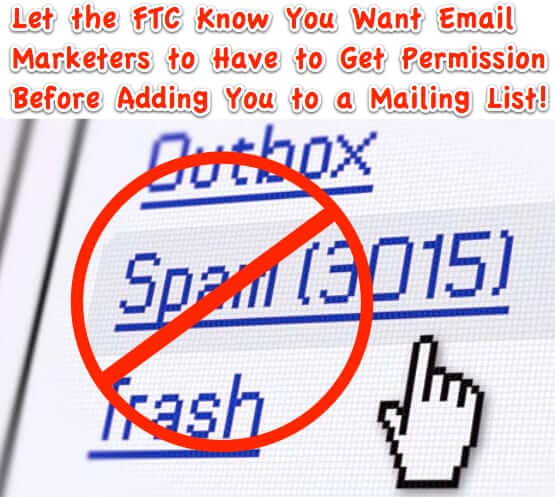
With little fanfare, this month the Federal Trade Commission (FTC) opened up a request for comments regarding our Federal anti-spam law, known as CAN-SPAM. For those who are not aware, the U.S. is the only first-world country that has not outlawed the practice of adding someone to a mailing list without first obtaining their express permission. Canada, the UK, and the EU all require prior permission. This is because that requirement here in the U.S. was defeated, primarily, by the email marketing lobby.
Here in the U.S., someone (business or otherwise) can legally add you to their mailing lists without your permission, and email you until you cry ‘uncle’ (i.e. unsubscribe). In fact presently the rule specifically states that they must simply provide you with “clear and conspicuous notice of the opportunity to decline to receive further commercial email messages.”
Current law actually makes it easy for someone else to sign you up for a mailing list! It’s not an uncommon practice to do this to people as either a practical joke, or even for malicious reasons (this is known as ‘listbombing’). Think these are isolated incidents? Think again, there are even businesses dedicated to doing this! All because the U.S. law is ‘opt-out’ (you have to ask to be taken off the list) rather than ‘opt-in’ (they can’t put you on the mailing list if you didn’t opt-in).
Again, only here in the United States; in all other civilized countries they can’t add you to their mailing lists in the first place, unless they have your direct permission.
Shouldn’t it be that way here in the U.S. too?
The Internet Patrol is completely free, and reader-supported. Your tips via CashApp, Venmo, or Paypal are appreciated! Receipts will come from ISIPP.
In its “Invitation to Comment”, the FTC explains that “The Commission is requesting public comments on its rule implementing the Controlling the Assault of Non-Solicited Pornography and Marketing Act (the “CAN-SPAM Rule” or “Rule”). The Commission is soliciting comments about the efficiency, costs, benefits, and regulatory impact of the Rule as part of its systematic review of all current Commission regulations and guides. All interested persons are hereby given notice of the opportunity to submit written data, reviews, and arguments concerning the Rule.”
They also note that “All questions are designed to assist the public and should not be construed as a limitation on the issues on which public comment may be submitted.”
So anyone, as a member of the public who has received email for which they did not opt-in (and that’d be anyone with an email address), can comment on how the U.S. should change its rule to be in line with the rest of the world, and get rid of that scourge of inboxes, unrequested commercial email for which the burden is on the recipient to make it stop.
If you happen to be part of an organization related to these issues, that’s great too, but hearing from lots of individuals who are fed up with the lenient U.S. rule that allows email marketers to fill up your inbox without permission is one of the surest ways to get the FTC to sit up and take notice.
You can file your comment online using the FTC’s comment form specifically for this issue here:
[Page no longer available – we have linked to the archive.org version instead]
Note that the deadline to file your comment is August 17th, 2017 so do it now while you’re thinking of it.
This is really important, so please share this information!
The Internet Patrol is completely free, and reader-supported. Your tips via CashApp, Venmo, or Paypal are appreciated! Receipts will come from ISIPP.










The US Constitution says “We the People of the United States…”, not We the Corporation, We the Advertiser, We the Marketer, etc. However, the US Government caters to all of these latter groups first. Why? All I can think of is for money, greed, and tax revenue. It’s time the US Government starts putting “We the People” first again (stop listening to the lobbies and listen to the people), just like Canada, the UK, and the EU puts the people first with requiring express permission first. I get 150 unsolicited mailing lists emails a day at work and 250 unsolicited mailing lists emails a day at home. These numbers do not include spam, these are just emails from mailing lists. If I unsubscribe to one, I get automatically signed up for 2 or 3 three more. So I have stopped unsubscribing and the increase has been a lot slower.
It’s time the laws/rules get back to “Opt-In” (requiring prior permission) instead of “Opt-Out”. I am tired of hearing; “It will stymie growth of new services”, “I can’t compete if can’t have this advertisement stream”, “It no different than bulk mail”, and the list goes on and on. It has been proven in Canada, the UK, and the EU that these excuses do not stymie growth and sales. So why are you catering to these corporations, advertisers, and marketers. All this Opt-out policy does is waste my time and money.
The placement of someone’s professional or personal email is not a commodity to be placed on a mailing list to be bought and sold. It’s time the US government stops allowing these corporations, advertisers, and marketers to buy and sell personal information. Personal privacy should come first; not corporate, advertiser, and marketer revenue streams and bottom lines.
Please return back to “Opt-In”, I can no longer afford it. I don’t have the time and deep pockets like corporations, advertisers, and marketers do.